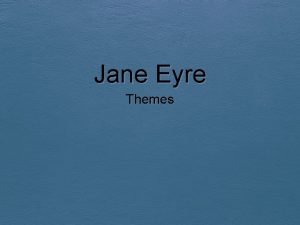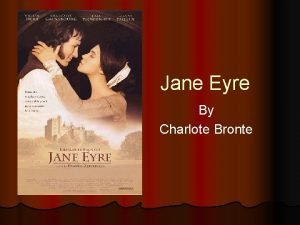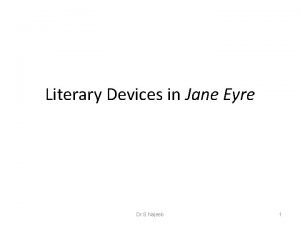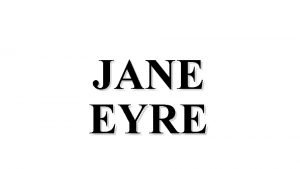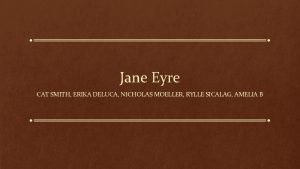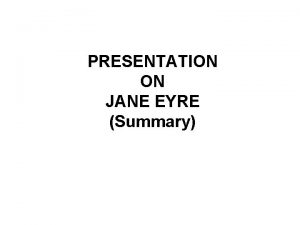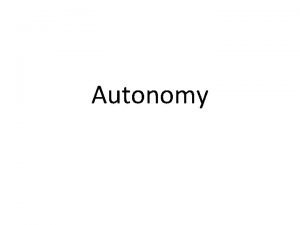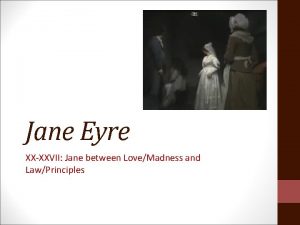LOVE VS AUTONOMY Jane Eyre Characterisation of Jane







- Slides: 7

LOVE VS AUTONOMY Jane Eyre

Characterisation of Jane ■ Love vs autonomy is a clear theme within the novel, with Brontë showing the power of both of these aspects of character throughout the novel. ■ Main way that Brontë develops this theme ■ Within Jane there is a constant conflict between love and control of her emotions (and therefore her independence) ■ This is seen throughout the novel but particularly when concerning Mr Rochester

Jane at Gateshead ■ At the beginning of the novel, Jane’s character is very much leaning love or passion than autonomy. ■ She originally attempts to allow her aunt and cousins to mistreat her (to an extent). ■ This is also shown through her lack of when she loses her temper with her cousin John Rivers (who constantly bullies her) “I received him in frantic sort”, and continues to lose control as she is taken to the Red Room. Still in Gateshead, she also loses her temper with Mrs Reed, and enjoys the sense of liberation this lack of control gives her - “ my soul began to expand, to exult, with the strangest sense of freedom, of triumph, I ever felt. ” ■ In this she allows her desire to be loved to take over and loses control – and in being taken to the Red Room loses any sense of independence she had at Gateshead. This later serves shows the contrast in Jane’s character as she gains control over her emotions in order to maintain her independence.

Jane at Lowood ■ At Lowood, Jane begins to understand the power of self control in maintaining her autonomy through the character of Helen Burns. ■ At first, Jane would willingly sacrifice her independence and health to feel loved. She speaks to Helen Burns ““to gain some real affection from you, or Miss Temple, or any other whom I truly love, I would willingly submit to have the bone of my arm broken, or to let a bull toss me, or to stand behind a kicking horse, and let it dash its hoof at my chest” to which Helen replies “. . you think too much of the love of human beings, you are too impulsive, too vehement” and introduces the idea of Christianity and faith to Jane’s life. This sense of faith is relied on by Jane when making decisions in order to maintain her self control, and therefore her autonomy later in the novel, thus the character of Helen Burns had a clear impact on Jane’s psyche and therefore on her sense of autonomy.

Jane and Mr Rochester ■ The relationship between Jane and Mr Rochester is a particularly passionate one – and therefore one in which the older Jane becomes conflicted between staying true to her morals and her independence and her love for him. ■ This becomes particularly clear when Jane discovers the existence of Mr Rochester’s wife Bertha Mason (at the wedding between Jane and Mr Rochester and she has to choose between her integrity and faith and her love for Mr Rochester. Her narration at this stage is perhaps the most clear in the novel in terms of Jane’s inner conflict between love and autonomy – “But the answer my mind gave ‘Leave Thornfield at once’- was so prompt, so dread, that I stopped my ears. ” and that she “cannot do it”. However, as previously mentioned, she relies on her faith and her morals and uses this in order to change her mind “But, then, a voice within me averred me that I could do it and foretold that I should do it”. ■ The intensity of this inner conflict shows the strength of both sides of Jane’s persona, and how she values her independence over her love. ■ However Jane eventually goes back to Mr Rochester, once she feels like she has been self sufficient, and when she feels like the relationship between her and Mr Rochester is equal (arguably to do with his loss of sight and therefore his reliance on her) “I am my husband’s life as fully as he is mine”

Jane and St. John Rivers ■ In contrast to the relationship between Jane and Mr Rochester, Jane and St. John River’s relationship is completely lacking in passion or love. ■ This serves to show the importance of love to Jane but also delves deeper into the interpretation of love. Whilst at the beginning of the novel, Jane seems to year for a sense of familial love, of belonging, this is no longer enough for her. In this case, the love that holds the most importance for Jane is that of a passionate love rather than the aforementioned familial love. ■ Jane finds certain elements of autonomy at Moorhouse, in that she becomes self sufficient and gains more independence than she has ever had access to. Yet, when St. John proposes to her she refuses due to their lack of passion for each other – despite St. Johns strong sense of faith. ■ This shows that Jane heavily values love, and does not necessarily always place her independence or self benefit over passion and love- further emphasising her inner conflict between love and autonomy.

Conclusion ■ Jane seems to have found a perfect balance between her conflicting feelings of love and autonomy in her marriage to Mr Rochester at the end of the novel. ■ In this, Brontë shows that although both of these feelings are incredibly powerful , there can be a comfortable balance between them. This is particularly important in the novel’s significance as a feminist text as Jane being able to maintain any sense of independence goes against the general treatment and stereotype of women at this time period.
